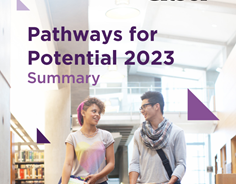Access and inclusion
Improving access to university means talented individuals have the opportunity to achieve success whatever their background or circumstances. From admissions and outreach to inclusive physical spaces and pastoral support, our universities want to draw from the widest possible pool of talent.
Our members offer support, on and off campus, and alongside schools and colleges with outreach and targeted initiatives such as:
- Cardiff University’s Discovery Programme for young people with Autism Spectrum Conditions, which offers 14 to 19 year-olds fortnightly mentoring sessions to boost learning skills and help them to find out more about university study.
- UNIQ, a free programme which gives 17 and 18-year-old students an opportunity to study at the University of Oxford, meet tutors, sample their chosen course, stay in a college and get help writing their application.
Have a look at what our universities are doing to increase access and widen participation:
Pathways for Potential 2023 - Executive Summary

Progress towards meeting Pathways for Potential commitments on tackling educational inequality and improving access to Higher Education - Summary
Download (PDF)In the last decade, the number of students from under-represented backgrounds going to university has increased – these students are now 61 per cent more likely to go on to higher education than 10 years ago and 30 per cent more likely to study at a Russell Group university than five years ago.[1] However our members are determined to do more to ensure anyone with the drive and determination to access higher education can do so, regardless of their circumstances.
As well as the ambitious proposals set out in our Pathways for Potential report, which include working with the Government to develop a 10-year national strategy to address educational inequality in the early years, schools and colleges, our members are delivering a range of projects in communities across every region and country of the United Kingdom.
- The University of Manchester runs an award-winning programme that has seen more than 1,000 staff and alumni become school governors. This helps build relationships with schools, offers professional development to school staff and helps promote activities that widen access to university.
- Queen Mary University of London works in partnership with several schools in East London, delivering a comprehensive science-oriented progression curriculum and raising attainment.
We are now looking to work even more closely with the Government and the Office for Students to improve access for disadvantaged students.
Overcoming barriers to going to university
Getting into university is not the same experience for everybody, and people can experience different obstacles that intersect in complex ways. Our universities offer a range of programmes with targeted support to help overcome those challenges so more people can get to university and complete their studies successfully:
- The number of care leavers studying at the University of Nottingham greatly increased in 2017/18 and these students are now more likely to continue their studies than the average UK student, thanks to wrap-around support, practical help and year-round accommodation.
- Queen’s University Belfast uses sport to foster early engagement with young men while at school, primarily from white working-class backgrounds, in years 8 to 10. The programme aims to foster pride and self-confidence, as well as the aspiration to progress to university in later years.
- The University of Liverpool works with a local Somali and Yemeni community group through their Fast Trackers initiative. Previous participants now work as mentors for the next generation of students, acting as positive role models and embedding the project deeper within the community.
Our universities have also developed alternative routes for students who might not otherwise meet the standard entry requirements. For example:
- Warwick University’s 2+2 programme has engaged with four local colleges for over 25 years and given 2,000 adult learners with few or no traditional qualifications a route into university education.
- The University of Edinburgh’s Access Programme provides adult learners with part-time courses to help them get on to degrees without needing to have A-Levels or Highers. It provides an entry route to over 150 courses within the University’s College of Arts, Humanities and Social Sciences.
Over half of Russell Group universities now offer degree apprenticeships, which provide another route into higher education, allowing students to earn while they study and get direct experience in the workplace with employers. The Universities of Birmingham, Leeds and Queen’s Belfast have collaborated with PwC to deliver a four-year technology degree apprenticeship, forming part of their commitment to address the UK’s technology skills gap, drive regional growth, as well as improve the diversity of the tech industry.
Advancing Access
Schools and colleges can also benefit from the "Advancing Access" initiative. Launched by Russell Group universities, it provides a variety of free resources and online events for teachers and advisers to help them support students' progression to leading universities.
Its activities are targeted towards remote, rural and coastal regions and provide teachers and advisers with information and support, events and virtual conferences, to improve their understanding of what our universities are looking for and how the admission process works.
[1] (2019 UCAS, End of cycle report; OfS access and participation dataset entry number for POLAR Quintile 1 students over the five years to 2017/18. )
-
Hamir Patel
hamir.patel@russellgroup.ac.uk
020 3816 1316
-
Hollie Chandler
Hollie.Chandler@russellgroup.ac.uk
020 3816 1307
 X
X
